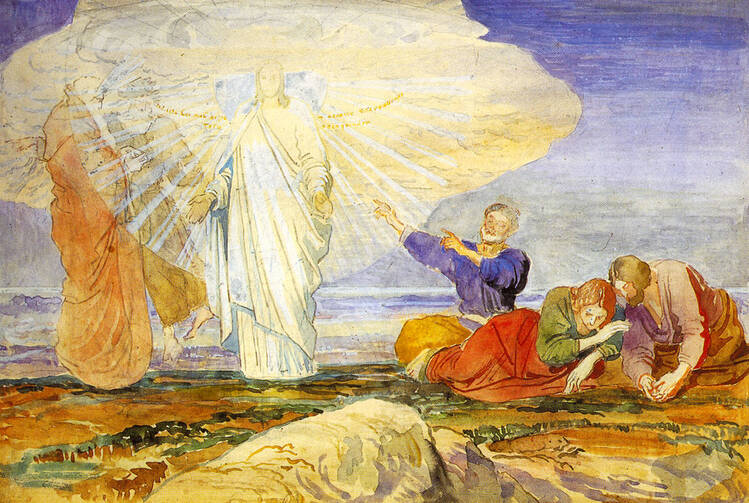A Homily for the Second Sunday of Lent
Readings: Genesis 15:5-12, 17-18 Philippians 3:17—4:1 Luke 9:28b-36
So much that Shakespeare wrote simmers with meaning. Take this little passage from “The Tempest.” The play itself is a fantasy, full of magic, monsters and spirits. At its end, Shakespeare reminds us that theater is fantasy. What we witness is unreal, and soon enough actors must take their leave. Come the curtain, we must awake from fantasy and go home.
Shakespeare’s genius is that he uses his play’s closing to remind us that life itself is but a dream, something from which we are destined to awake.
Our revels now are ended. These our actors,
As I foretold you, were all spirits and
Are melted into air, into thin air:
And, like the baseless fabric of this vision,
The cloud-capp’d towers, the gorgeous palaces,
The solemn temples, the great globe itself,
Ye all which it inherit, shall dissolve
And, like this insubstantial pageant faded,
Leave not a rack behind. We are such stuff
As dreams are made on, and our little life
Is rounded with a sleep (IV.i.148–158).
Put less elegantly: Someday what now seems so solid to us, the lives we are living, will dissolve as dreams do at break of day.
Awakening from sleep is also the twist that St. Luke brings to his account of the Transfiguration.
Mark and Matthew tell us the event occurred six days after Jesus had predicted his coming Passion. The ancient church sometimes called Sunday “the eighth day.” Why? God created the world in seven days, but the resurrection is such a novelty that it should be numbered outside the original act of creation. Hence, the “eighth day,” the day St. Luke tags for the Transfiguration.
Mark and Matthew tell us that Jesus conversed with the two pillars of the Old Testament, Moses and Elijah, but Luke adds that our Lord spoke to them “about his exodus,” his coming death, again heightening the notion that the apostles are receiving a foretaste of the paschal mystery, the death and the resurrection of Christ (9:31).
St. Luke brings this home with his own Shakespearean rift on awakening from sleep into a new world, a world more real than the one in which we dwell. He alone tells us that the three chosen disciples had fallen asleep, something that happens a lot in the Scriptures, especially during theophanies. Abram does so in God’s presence (Gen 15:12), and the prophet Daniel tells us that “as he spoke to me, I fell forward unconscious; he touched me and made me stand up” (8:18). God’s entrance overwhelms normal life.
Peter and his companions had been overcome by sleep,
but becoming fully awake,
they saw his glory and the two men standing with him (Lk 9:32).
The apostles enter a new awareness, and while it lasts, everything else seems but a dream from which they have awakened.
And, like the baseless fabric of this vision,
The cloud-capp’d towers, the gorgeous palaces,
The solemn temples, the great globe itself,
Ye all which it inherit, shall dissolve
And, like this insubstantial pageant faded,
Leave not a rack behind.
Lent is always about the life to come. Whatever we are doing during the sacred season should prepare us for that. As in all Gospel accounts, we are told what happened to Christ and his disciples so that we may better understand, better prepare ourselves for what will happen to us.
On this Second Sunday of Lent, St. Luke wants us to know that there will come a time when all our preoccupations, our cares and concerns, will cease. It will be like awakening from sleep. We will look upon the Lord in his glory, and everything else will appear so insubstantial. Or as Shakespeare put it,
We are such stuff
As dreams are made on, and our little life
Is rounded with a sleep.








